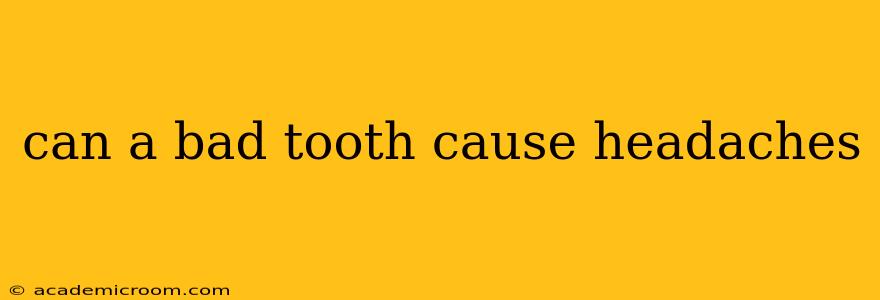Yes, a bad tooth can absolutely cause headaches. The connection might not be immediately obvious, but dental problems are a surprisingly common source of head pain. This isn't just about throbbing toothaches; various dental issues can trigger headaches, often in unexpected ways. Let's delve into the specifics.
How Can a Bad Tooth Lead to Headaches?
The link between a bad tooth and headaches often stems from the intricate network of nerves and blood vessels connecting your teeth, jaw, and head. When a tooth is infected, inflamed, or damaged, it can trigger pain signals that radiate throughout this network. This pain can manifest as:
-
Referred Pain: Pain felt in one area when the actual source is elsewhere is called referred pain. The nerves responsible for sensations in your teeth and head are closely intertwined, making it easy for pain originating in a tooth to be perceived as a headache.
-
Muscle Tension: Severe toothaches often lead to clenching or grinding your teeth (bruxism), which strains the jaw muscles. This tension can then spread to the head and neck, causing headaches, often tension headaches.
-
Sinus Infection: Dental infections can sometimes spread to the sinuses, resulting in a sinus infection. Sinus infections are a well-known cause of headaches.
-
Inflammation: Inflammation from a dental abscess or gum disease can cause pressure to build up, triggering pain that spreads to the head.
What Types of Headaches Can a Bad Tooth Cause?
A bad tooth can contribute to several types of headaches, including:
-
Tension Headaches: These are the most common type, often characterized by a tight band-like feeling around the head. Jaw muscle tension from a dental problem frequently contributes to tension headaches.
-
Migraines: While not directly caused by a bad tooth, dental issues can trigger migraines in susceptible individuals. The pain and pressure from a dental problem might act as a trigger for a migraine episode.
-
Cluster Headaches: These are severe headaches characterized by intense pain on one side of the head. Although less commonly linked to dental problems, a severe dental infection could potentially contribute to or exacerbate cluster headaches.
What are the Symptoms of a Tooth-Related Headache?
Identifying a tooth-related headache can be tricky, as symptoms can overlap with other headache types. However, some clues to look for include:
- Pain concentrated around the temple or jaw: The pain might be on the same side as the affected tooth.
- Pain worsened by chewing or biting: This is a strong indicator of a dental source.
- Sensitivity to temperature changes: Hot or cold foods or drinks might exacerbate the pain.
- Swelling or tenderness in the gums or jaw: This suggests a localized dental infection or inflammation.
Can a Tooth Abscess Cause Headaches?
Yes, a tooth abscess (a pocket of pus at the root of a tooth) is a common cause of headaches. The infection and pressure from the abscess can directly irritate nerves and spread pain to the head. Abscesses are a serious dental emergency requiring prompt professional attention.
How to Treat Tooth-Related Headaches?
The best way to treat a tooth-related headache is to address the underlying dental problem. This typically involves seeing a dentist for diagnosis and treatment, which might include:
- Root canal therapy: To treat infected tooth pulp.
- Extraction: If the tooth is severely damaged or infected.
- Antibiotics: To combat infection.
- Pain relief medication: Over-the-counter pain relievers like ibuprofen or acetaminophen can provide temporary relief, but should not replace professional dental care.
When Should You See a Dentist?
Don't ignore persistent headaches, especially those accompanied by dental symptoms. Schedule an appointment with your dentist if you experience:
- Severe or persistent toothache.
- Swelling in your gums or jaw.
- Difficulty opening your mouth.
- Fever or chills.
Early diagnosis and treatment of dental problems can prevent headaches and other complications. Ignoring dental issues can lead to more significant problems down the line, impacting your overall health and well-being.
Disclaimer: This information is for general knowledge and informational purposes only, and does not constitute medical advice. Always consult with a qualified healthcare professional for any health concerns or before making any decisions related to your health or treatment.
